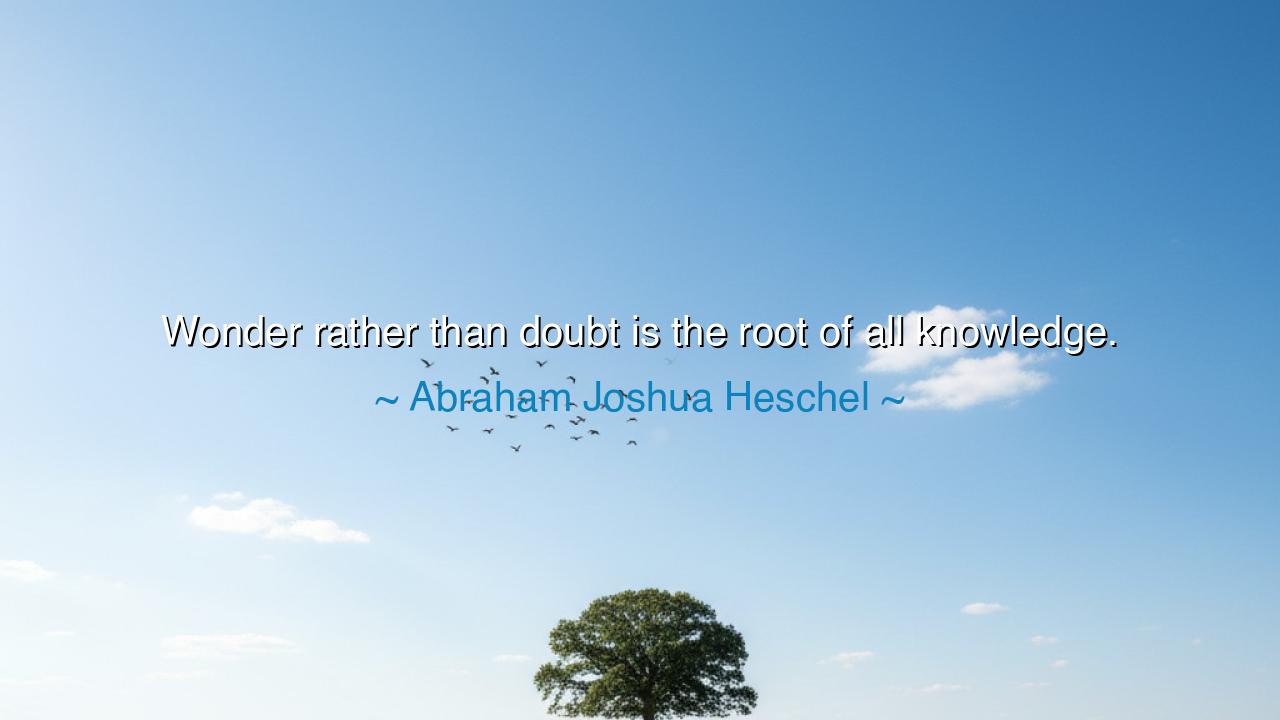
Wonder rather than doubt is the root of all knowledge.






In the luminous words of Abraham Joshua Heschel, the sage of spirit and reason, we find a truth both timeless and profound: “Wonder rather than doubt is the root of all knowledge.” These words awaken in us the oldest instinct of the human soul — the urge to gaze upon the world not as conquerors dissecting it, but as children beholding it for the first time. For wonder is not ignorance; it is the sacred curiosity that gives birth to wisdom. Doubt, though it sharpens the intellect, begins with negation; wonder, however, begins with awe. It does not ask, “What can I disprove?” but “What beauty have I yet to behold?”
The origin of this quote lies in Heschel’s lifelong effort to reconcile faith and reason, mystery and understanding. Born into the rich soil of Jewish mysticism and steeped in the discipline of philosophy, Heschel walked between worlds — the world of spirit and the world of science, the divine and the human. In an age dominated by skepticism, he reminded mankind that the thirst for knowledge must spring not from pride, but from reverence. For when we question only to dominate, we become blind to the wonder that gives knowledge meaning. But when we question to understand, to listen, and to love the truth — then we become, as Heschel believed, co-creators with the divine.
To wonder is to stand humbly before the unknown, acknowledging its majesty while seeking to know it more deeply. In the ancient world, this was seen as the beginning of philosophy itself. Aristotle wrote that philosophy begins in wonder — in that sacred bewilderment that moves the heart before the mind engages. When the early astronomers looked to the stars, they did not begin with formulas; they began with awe. It was wonder that compelled Galileo to lift his telescope to the heavens, wonder that moved Newton to ponder why the apple fell, and wonder that urged Einstein to ask how light could dance between particle and wave. All true discovery, whether of the universe or of the soul, begins not with arrogance, but with amazement.
Contrast this with doubt, which, though necessary, is but a tool. Doubt dissects; wonder connects. Doubt clears the field of illusion; wonder plants the seeds of vision. If we live only by doubt, we risk becoming cynics — knowing much, but believing nothing. Yet if we live only by wonder, we risk delusion — loving mystery without seeking truth. The wise know that both are needed, but that wonder must lead, for only wonder keeps the flame of curiosity alive when reason alone grows cold. As Heschel taught, doubt is the question; wonder is the heart that makes the question worth asking.
There is a story told of the astronomer Carl Sagan, who devoted his life to exploring the vastness of the cosmos. When he looked upon the pale blue dot — our Earth seen from the edge of the solar system — he was struck not by doubt, but by awe. In that small glimmer suspended in darkness, he saw both our fragility and our greatness. His scientific work was built not upon arrogance, but upon humility — a kindred spirit to Heschel’s thought. “We are a way for the universe to know itself,” Sagan wrote. This, too, is wonder — the recognition that to know is to be part of something infinitely larger than oneself.
Wonder, then, is not an escape from knowledge but its deepest foundation. It opens the heart to wisdom, while doubt alone can close it. The artist, the scientist, the philosopher, and the saint — all begin their journeys with the same breath of astonishment. The difference between the wise and the weary is that the wise never lose that first breath. They never allow knowledge to harden into pride. They remember that every answer is the door to a greater mystery, and every truth, no matter how bright, is surrounded by a greater light yet unseen.
Let this be the lesson for all who seek truth: do not let knowledge extinguish wonder. Approach every question, every encounter, every breath of life with reverence. Look upon the stars not as data points, but as the handwriting of eternity. Read books, study science, build wisdom — but never forget to marvel. For it is in wonder that the heart becomes wise, and the soul remembers its origin. The world reveals its secrets not to the proud mind that demands, but to the humble heart that listens.
And so, dear listener, carry this teaching of Heschel as a lantern in your journey: wonder is the wellspring of all knowledge. Let doubt refine you, but let wonder sustain you. Seek truth not as a warrior seeking conquest, but as a pilgrim approaching the sacred. For when you live in wonder, the universe ceases to be a puzzle to solve and becomes a poem to understand — and in that understanding, you will find both knowledge and peace.






AAdministratorAdministrator
Welcome, honored guests. Please leave a comment, we will respond soon